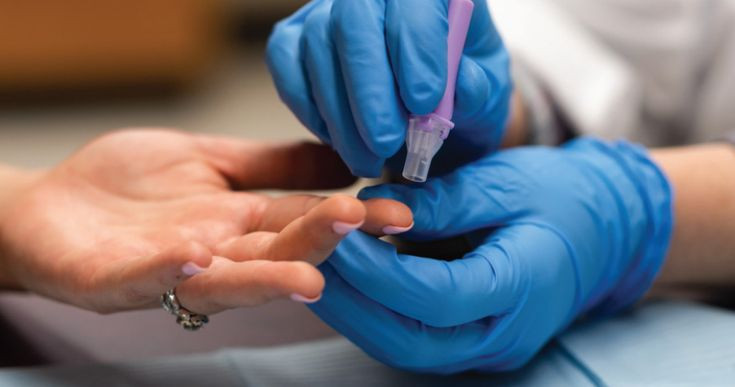The Molecular Diagnostics Market: A Revolution in Disease Diagnosis
The Molecular Diagnostics Market is experiencing remarkable growth, fueled by a convergence of factors. This market revolves around advanced diagnostic techniques that leverage genetic and proteomic data to precisely identify, diagnose, and monitor diseases. It incorporates molecular biology methods like polymerase chain reaction (PCR), next-generation sequencing (NGS), and proteomics to assess genetic markers and protein expression in cells. The market is driven by the increasing need for early and accurate diagnosis of diseases like infectious diseases and cancers, as well as the growing acceptance of personalized medicine.
Market Dynamics: Driving Forces and Trends
The Molecular Diagnostics Market is propelled by several key factors:
-
Rising Prevalence of Diseases: The surge in infectious diseases and cancers globally has significantly increased the demand for sensitive and specific diagnostic tools. Molecular diagnostics offer a revolutionary approach to detecting these diseases early and accurately, enabling timely treatment and improved patient outcomes. For instance, PCR-based techniques are highly effective in diagnosing tuberculosis and HIV, while NGS is used to detect genetic mutations associated with various cancers.
-
Technological Advancements: Breakthroughs in molecular diagnostic technologies, such as PCR-based techniques and next-generation sequencing, have revolutionized disease diagnosis by providing rapid and accurate results. These innovations are crucial in detecting diseases like tuberculosis, HIV, and cancers, facilitating timely treatment and improving patient outcomes.
-
Personalized Medicine: The increasing adoption of personalized medicine has further propelled the market, as molecular diagnostics play a critical role in tailoring treatments based on individual genetic profiles. By analyzing a patient's genetic makeup, doctors can identify the best treatment options and predict potential risks, leading to more effective and targeted therapies.
Market Opportunities: A Growing Landscape
The molecular diagnostics market presents a plethora of growth opportunities due to the rising demand for personalized medicine and advanced diagnostic tools. This demand is driven by an increasing prevalence of chronic diseases, such as cancer, infectious diseases, and genetic disorders, which require more accurate and timely detection. Molecular diagnostics offer a highly sensitive and specific method for early disease identification, leading to more effective treatments. Furthermore, ongoing advancements in genomics and biotechnology are creating pathways for more innovative diagnostic products, expanding market potential.
Regional Insights: Divergent Growth Patterns
The molecular diagnostics market is experiencing varied growth across different regions due to differences in healthcare infrastructure, disease prevalence, and government initiatives. North America is expected to hold the highest share in the Molecular Diagnostics market. This region's dominance is attributed to its advanced healthcare systems, strong research and development activities, and early adoption of cutting-edge diagnostic technologies. High investments in precision medicine and favorable regulatory frameworks also bolster market growth in this region.
Europe, too, benefits from a well-established healthcare sector, with increasing demand for advanced diagnostics to manage chronic diseases. The region has witnessed significant investments in molecular diagnostics research and infrastructure, driving market growth. Other regions, such as Asia-Pacific, are also experiencing rapid growth in the molecular diagnostics market, driven by rising healthcare expenditure, increasing awareness of genetic diseases, and a growing number of diagnostic centers.
Market Segmentation: A Comprehensive View
The molecular diagnostics market can be segmented based on various factors, providing a comprehensive understanding of its diverse landscape:
By Product & Service
- Reagents & Kits: These include the essential components for molecular diagnostic tests, such as DNA probes, enzymes, and buffers. The market for reagents and kits is expected to grow significantly due to the increasing demand for molecular diagnostics.
- Instruments: These are specialized devices used to perform molecular diagnostic tests, such as PCR machines, sequencers, and microarrays. The instruments segment is anticipated to witness substantial growth driven by advancements in technology and the increasing adoption of automated diagnostic platforms.
- Services & Software: This segment encompasses services like laboratory testing, data analysis, and software solutions for managing and interpreting molecular diagnostic results. The growth of this segment is driven by the increasing complexity of molecular diagnostics and the need for specialized expertise.
By Test Type
- Lab Tests: These are molecular diagnostic tests performed in specialized laboratories using advanced equipment and techniques. This segment is expected to continue dominating the market due to the high accuracy and complexity of laboratory tests.
- PoC Tests: Point-of-care tests are designed for use in non-laboratory settings, such as doctor's offices or homes. The growing demand for rapid and accessible diagnostic solutions is driving the growth of the PoC tests segment.
By Technology
- Polymerase Chain Reaction (PCR): PCR is a widely used molecular diagnostic technique for amplifying DNA sequences, allowing for sensitive detection of disease-causing organisms or genetic mutations. The PCR technology segment is expected to witness substantial growth driven by the widespread adoption of PCR-based tests for various applications.
- Isothermal Nucleic Acid Amplification Technology (INAAT): INAAT is a newer technology that amplifies DNA or RNA without the need for temperature cycling, offering faster and more efficient results. The INAAT segment is anticipated to grow rapidly due to its advantages in terms of speed and cost-effectiveness.
- DNA Sequencing & Next-generation Sequencing (NGS): NGS is a powerful technology that allows for simultaneous sequencing of millions or billions of DNA fragments, enabling comprehensive genetic analysis. The NGS segment is expected to witness significant growth driven by its applications in cancer diagnostics, genetic testing, and personalized medicine.
- In Situ Hybridization (ISH): ISH is a technique for detecting specific DNA or RNA sequences within cells or tissues, providing valuable information for diagnosis and prognosis. The ISH segment is expected to grow steadily due to its applications in various disease areas.
- DNA Microarrays: DNA microarrays are used to simultaneously analyze the expression of thousands of genes, providing a comprehensive view of gene activity. The DNA microarray segment is anticipated to grow due to its applications in cancer diagnostics and drug discovery.
- Other Technologies: Other technologies include techniques like mass spectrometry and protein microarrays, which are used for identifying and quantifying specific proteins or biomarkers. The growth of this segment is driven by advancements in these technologies and their increasing applications in diagnostics.
By Application
- Infectious Diseases Diagnostics: Molecular diagnostics are widely used for diagnosing infectious diseases, such as HIV, tuberculosis, and influenza. The infectious diseases diagnostics segment is expected to witness substantial growth driven by the global burden of infectious diseases.
- Oncology Testing: Molecular diagnostics play a crucial role in cancer diagnosis, treatment, and prognosis. The oncology testing segment is anticipated to grow rapidly due to advancements in molecular diagnostics and the increasing adoption of personalized cancer therapy.
- Genetic Testing: Molecular diagnostics are used for genetic testing to identify genetic disorders, predict disease risk, and personalize treatment. The genetic testing segment is expected to witness significant growth driven by the increasing awareness of genetic diseases and the growing adoption of genetic testing.
- Other Test Types: This category includes various other molecular diagnostic tests, such as autoimmune disease testing and pharmacogenomics testing. The growth of this segment is driven by the development of new diagnostic tests for emerging diseases and the increasing adoption of precision medicine.
By End User
- Diagnostic Laboratories: Diagnostic laboratories are major end users of molecular diagnostics, providing specialized testing services. The diagnostic laboratories segment is expected to dominate the market due to the high demand for sophisticated molecular diagnostic tests.
- Hospitals & Clinics: Hospitals and clinics are increasingly adopting molecular diagnostics for patient diagnosis and management. The hospitals and clinics segment is anticipated to grow steadily due to the increasing availability of molecular diagnostic tests and the growing need for accurate and timely diagnostics.
- Other: This category includes other end users of molecular diagnostics, such as research institutions, pharmaceutical companies, and government agencies. The growth of this segment is driven by the increasing use of molecular diagnostics in research and development.
Key Players in the Market: Shaping the Landscape
The Molecular Diagnostics Market is characterized by the presence of several key players, both large multinational corporations and smaller specialized companies, who are driving innovation and market growth. Some of the prominent players in the market include:
North America
- Abbott Laboratories: Abbott Laboratories is a leading global healthcare company with a strong presence in the molecular diagnostics market. The company offers a wide range of diagnostic tests for various diseases, including infectious diseases, cancer, and genetic disorders.
- Danaher Corporation: Danaher Corporation is a diversified technology company with a focus on life sciences and diagnostics. The company's molecular diagnostics portfolio includes instruments, reagents, and software solutions for various applications.
- Quest Diagnostics: Quest Diagnostics is a leading provider of diagnostic testing services, including molecular diagnostics. The company offers a comprehensive range of molecular diagnostic tests for various disease areas.
- Hologic, Inc.: Hologic, Inc. is a leading manufacturer of diagnostic and medical imaging equipment, including molecular diagnostics systems. The company's molecular diagnostics portfolio includes tests for cervical cancer, HPV, and other diseases.
- Thermo Fisher Scientific: Thermo Fisher Scientific is a global leader in scientific research and laboratory equipment, including molecular diagnostics. The company offers a wide range of instruments, reagents, and software solutions for various molecular diagnostic applications.
Europe
- bioMérieux: bioMérieux is a global leader in the field of in vitro diagnostics, with a strong presence in the molecular diagnostics market. The company offers a wide range of molecular diagnostic tests for various diseases, including infectious diseases, cancer, and genetic disorders.
- Roche Diagnostics: Roche Diagnostics is a leading provider of in vitro diagnostics, including molecular diagnostics. The company offers a comprehensive range of molecular diagnostic tests for various disease areas, including infectious diseases, cancer, and genetic disorders.
- Siemens Healthineers: Siemens Healthineers is a leading medical technology company with a strong presence in the molecular diagnostics market. The company offers a range of molecular diagnostic instruments, reagents, and software solutions.
- QIAGEN: QIAGEN is a leading provider of molecular diagnostics solutions, including sample preparation, DNA extraction, and PCR kits. The company offers a wide range of products for various molecular diagnostic applications.
Asia-Pacific
- Sysmex Corporation: Sysmex Corporation is a leading manufacturer of medical diagnostic equipment, including molecular diagnostics systems. The company offers a range of molecular diagnostic tests for various diseases, including infectious diseases, cancer, and genetic disorders.
- BGI Group: BGI Group is a leading genomics research and diagnostics company, with a strong presence in the molecular diagnostics market. The company offers a wide range of molecular diagnostic tests for various diseases, including infectious diseases, cancer, and genetic disorders.
- Biocon: Biocon is a leading Indian biotechnology company with a focus on biosimilars and molecular diagnostics. The company offers a range of molecular diagnostic tests for various diseases, including infectious diseases, cancer, and genetic disorders.
- Mylab Discovery Solutions: Mylab Discovery Solutions is a leading Indian molecular diagnostics company, offering a wide range of tests for infectious diseases, cancer, and genetic disorders.
- Trivitron Healthcare: Trivitron Healthcare is a leading Indian medical technology company, offering a range of molecular diagnostic instruments and reagents.
- XCyton Diagnostics: XCyton Diagnostics is a leading Indian molecular diagnostics company, offering a range of tests for infectious diseases, cancer, and genetic disorders.
- HLL Lifecare Limited: HLL Lifecare Limited is a leading Indian healthcare company, offering a range of molecular diagnostic tests for various diseases, including infectious diseases, cancer, and genetic disorders.
The Future of Molecular Diagnostics: A Bright Outlook
The future of molecular diagnostics is bright, driven by continuous technological advancements, increasing demand for personalized medicine, and rising awareness of genetic diseases. The market is expected to witness significant growth in the coming years, with new technologies and applications emerging constantly. The focus on personalized medicine and the development of more targeted therapies will continue to drive innovation in the molecular diagnostics market. As the market evolves, we can expect to see more sophisticated and accurate diagnostic tests that are tailored to individual patient needs.
The Molecular Diagnostics Market is a vital force in the advancement of healthcare, enabling doctors to diagnose and treat diseases more effectively. As the market continues to grow, we can expect to see even more innovative and impactful diagnostic solutions that improve patient outcomes and revolutionize the way diseases are managed.


















